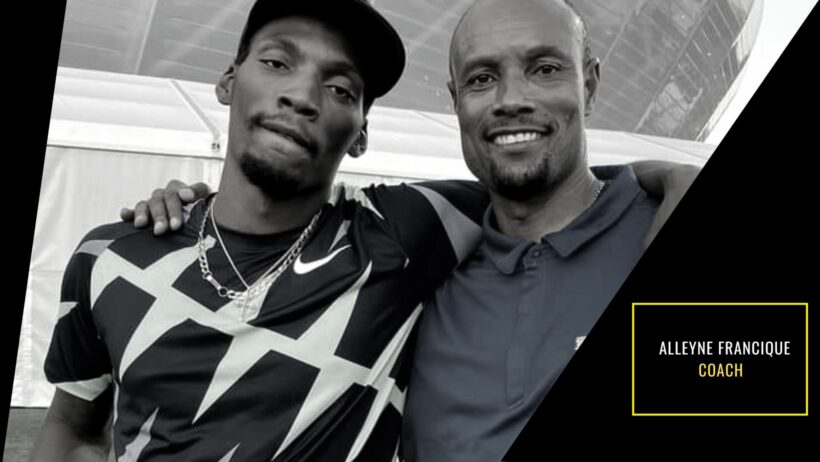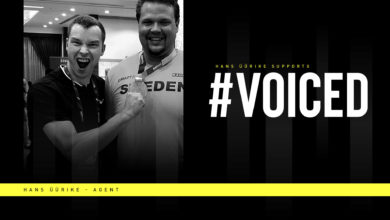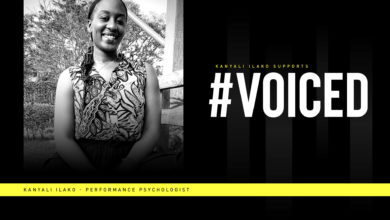Country: Grenada
Profession: Coach, former 400m athlete
Career highlights:
- 2x Olympian
- 2006 & 2004 IAAF World Indoor Champion
- 2006 Commonwealth Games Silver Medallist
- 2006 Central American & Caribbean Games Silver Medallist
Alleyne won Grenada’s first global medal when he became world indoor champion in Budapest 2004. He was the Grenada track and field team’s head coach for the 2016 Olympic Games. He is currently assistant coach at Texas A&M University and has helped Fred Kerley earn a silver medal in the 100m at the 2020 Olympics and gold at the 2022 World Champs.
Alleyne and his wife (Dr Akilah Carte, also a former athlete) are the founders of Francique Sport & Education Consulting, a company that specializes in education, research, and development in sports. In 2021, he obtained an Erasmus Mundus Joint M.A. in Sports Ethics and Integrity from KU Leuven.
Can you describe what goes through your mind when you watch your athlete’s race at an Olympic Games or World Championships?
We prepare for every scenario such as heats, semi-finals, and finals, and have instructions that guide athletes on how to qualify for the next round, so basically what goes through my mind is “Let’s execute the game plan”.
Did you get more nervous for a race as an athlete or coach (and why)?
As an athlete, I generally didn’t get too nervous as I got more experience and ran more races. But having said that, I remember making the final for the first time and attempting to twist my ankle so I could not run the final! As I got better over the years, I no longer got that nervous😊.
As for my athletes, generally no, I don’t get nervous. With Fred, I’m not nervous because I know of his mental toughness, and he sticks to the game plan. We know what the goal is; if you want to win a gold medal, then we work towards that and try to remember that everyone in the field is trying to win the gold too. However, sometimes I get a little nervous when it comes to college athletes who are 18 and 19 years old and still learning to race. But on the professional level, this is their job, so they generally only get into races when they are already performing well.
Retirement can be a tough transition for many athletes, can you tell us a bit about the challenges you faced when you initially retired from competing at the elite level?
I was lucky in that I retired after the Olympic Games in China in 2008, and this is when I wanted to retire. I went straight into coaching at college level (my boss was my former coach). I would say it was an easy transition for me because I didn’t have to sit out a couple of years, I went from training and competing to coaching and teaching. It worked well because I was surrounded by the right team.
Sports Ethics and Integrity is an interesting field of study – how did you end up pursuing a degree in it?
In 2019 the Grenada NOC contacted me because the IOC was looking for past Olympians to sponsor for studies and asked me to apply if I was interested. I grabbed this opportunity, having graduated from university 17 years previously! It was free education, and I didn’t want to pass up the opportunity to earn a master’s degree in Europe. I applied, and out of 22 interviewees, I was one of the 7 selected. I am grateful to the IOC; I have always wanted to do something in that capacity because I enjoy sports.
What is your favourite food from Grenada?
My favourite food is the Grenada national dish called “Oil Down” – a salted meat and vegetable stew. We also have it every Independence Day (07 February).
When have you been the most challenged?
In the year leading up to the 2004 Olympics, I was the 400m world indoor champion, winning the first global medal for my country, and was also number one on the 400m world rankings. So leading up to Athens I was a favourite to win, and going into the competition with the whole country cheering you was challenging. I wanted to win so badly that I put a lot of pressure on myself, and I ended up coming fourth.
As a coach, I would say the Tokyo Olympics when Fred decided he wanted to run 100m because that was not what we trained for. The 400m and 800m are my specialities, so 100m is more technical and new to me. I wanted him to do so well based on the decision he had made, so it was a challenging thing, but I think when the pressure is on that is when I am at my best.
What is your favourite road to drive along?
I’m from the island; I like driving on the western side right by the ocean, while listening to reggae music.
What book would you take to a desert island (if you could only have one)?
Two of my favourite people in the world are Nelson Mandela and Steve Biko, and being stuck on a desert island would be a good opportunity to finish reading “Long Walk to Freedom”.


